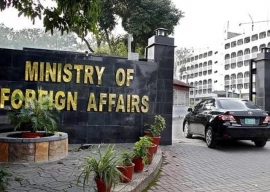-(1)1600071379-0/business1593402232-0-(1)-(1)1600071379-0.jpg)
Avenues of private equity growth in Pakistan
With challenges for investors, there are a few low-hanging fruits to pick
ISLAMABAD:
Global private market assets have grown by over $4 trillion in the past decade, an increase of 170%, while the number of private equity firms has more than doubled. Comparatively, the growth of public securities over the same period has been 100%.
It is clear that private market investment transactions like private equity and venture capital are growing fast and are becoming an asset of choice in the global arena. So, why has this industry experienced lethargic growth in Pakistan, especially when these transactions can have a large effect on job creation and small and medium enterprise (SME) development?
We spoke to a few experts in the field and provide a SWOT analysis by focusing on strengths, weaknesses, opportunities and threats.
Strengths and opportunities
Strengths and opportunities in Pakistan for private equity and venture capital include favourable demographics (a young urban and large population), an expanding middle-class-driven economy, improving ease of doing business ranking/ digital transformation, and CPEC-China driving infrastructure development and future economic linkages.
As Jamil Akbar, private equity and corporate strategy expert, puts it, “With such low penetration of venture capital and private equity, there are many opportunities in this untapped growth market of Pakistan.
“There is an entrepreneurial spirit and culture, and an ability not just to replicate tried and tested ideas from similar markets, like Indonesia, Turkey and India, but also to develop innovative solutions to address local market gaps.”
Perceptions of foreign investors are likely worse than reality. Investors are often pleasantly surprised by infrastructure (roads, airports, electricity, hospitals, educational institutions, etc) and retail (presence of malls provide evidence of a thriving modern retail culture and diverse restaurants with a variety of cuisines).
In addition to these, people are not just hospitable but go out of their way to help you connect and solve issues.
There are other advantages of doing business in Pakistan, which may not meet the eye from afar but become apparent in context. English is the language of courts and businesses and most people are comfortable conversing with foreigners, making it an easier country to operate in than others. The media is open with over 70 channels and 20 or more news channels, providing avenues to different regions and ethnicities to express political views or let off steam.
Critical in all this is technology. Over 75 million people have access to mobile broadband with a large penetration of smartphones. This rapid growth is resulting in a massive platform for digital mobile disruption.
Weaknesses and threats
Weaknesses for the private capital space include fiscal deficit and a low export base, resulting in a weak and depreciating currency, prevalence of corruption, internal logistical and infrastructure gaps, and strong dependency on the “establishment” to hold the country together due to weak government institutions.
Systems don’t work so well. Professional, social and government networks are needed to get things done – most of the time even without corruption. Persistence and perseverance are key to getting things done with a constant need for facilitation. Kulsoom Lakhani, Partner i2iVentures, says the current flow of money is challenging when attracting foreign investors.
“Venture capital firms have a difficult time as the process is onerous. That’s why large firms are at an advantage as they have local licences and large back offices. They are able to undertake the lengthy processes which are needed. You have to hire established law firms which have the muscle and prior experience to push things through.”
Regulations also prohibit local investors from sending their money offshore which may sound positive in the face of it, but many investment firms are registered overseas. This excludes local investors who have vested interests in the market and a higher comfort level with local challenges.
Low-hanging fruits
It’s clear that a large number of hurdles have to be crossed in Pakistan before a free and open system for private capital is created. Challenges are present for both local and foreign investors but there are a few low-hanging fruits to capitalise on.
The venture capital space is quite active, with a number of players springing up for seed, Series A and B rounds and high potential deals, increasing local and foreign interest.
Healthcare and logistics are the two spaces to look at given the need for development, dealing with supply shortage, lower regulation and demand side being willing to pay for these services.
In addition, the Naya Pakistan housing boost has proven to be a driver of growth and opportunities in the construction and housing-related industries.
Finally, family groups have warmed up to the idea of external investment and now realise the advantages of formal capital helping create value, not just through governance, but reputation enhancement, the ability to hire better qualified human resources and opportunities for further access to capital.
It appears that private capital markets in Pakistan aren’t a write-off just yet.
The writer is a Sustainable Business Consultant and Doctoral Researcher
Published in The Express Tribune, September 14th, 2020
Like Business on Facebook, follow @TribuneBiz on Twitter to stay informed and join in the conversation.

1714577069-0/image-(21)1714577069-0-270x192.webp)




1714570828-0/WhatsApp-Image-2024-05-01-at-6-30-21-PM-(1)1714570828-0-270x192.webp)



1714370039-0/ojwilson-(1)1714370039-0-270x192.webp)

-(1)1714458896-0/ASP-(2)-(1)1714458896-0-270x192.webp)
-(1)1714463604-0/Untitled-design-(4)-(1)1714463604-0-270x192.webp)








COMMENTS
Comments are moderated and generally will be posted if they are on-topic and not abusive.
For more information, please see our Comments FAQ